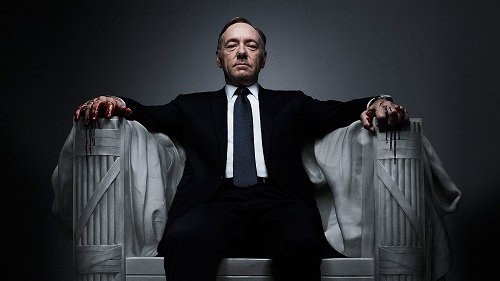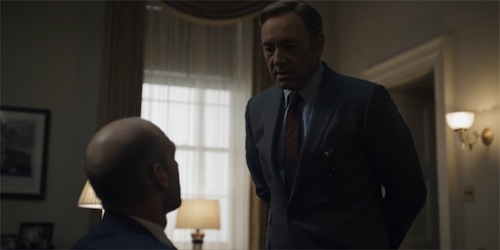House of Cards, Season 1
Premiered Friday, Feb. 1st on Netflix
Only a few years removed from an acclaimed collaboration with Aaron Sorkin on The Social Network, David Fincher has dipped his toe into the realm of serial storytelling with the first Netflix original series, House of Cards. A cynic’s alternative to Sorkin’s monumental series The West Wing, if The West Wing offered what people wish politics was like, with just enough hardball to give it weight, House of Cards is the world that people both fear and assume is more realistic.
Centered on the Democratic House Majority Whip, Francis Underwood (Kevin Spacey), this tale of political intrigue stretches out from the halls of Congress to both the Executive Branch and the Fourth Estate, showing how the changing face of journalism can indulge the darker arts of politics. We’ve come a long way from All The President’s Men. After being slighted by the President, a man Underwood worked hard to elect, Underwood sets out for his own form of political revenge. Among the players in his schemes is the ambitious and thoroughly modern journalist Zoe (Kate Mara), part of a generation more concerned about getting the most hits than getting a story right.
As a production, House of Cards is every bit as stylistically bombastic as one might expect from Fincher, with text messages popping up on screen and Underwood frequently breaking the fourth wall with a devilish glint. Still, Underwood is a complex being. His tactics are certainly Machiavellian but the ends to which he uses them are not unambiguously greedy or destructive. His wife Claire (Robin Wright) represents this dynamic even more as an aggressive executive director of a non-profit that works on environmental and global development issues. The contrast of noble ends and rough means is refreshing or enviable in a curious way, you want these people working for causes you care about because they are effective. Their professional dynamic is equalled by their personal dynamic, affectionate and yet clearly secondary to their ambitions, something both understand. It is nice that this isn’t the tale of a dutiful wife backing the wayward politico as Claire can give as good as she gets.
While the show sometimes has trouble balancing its large constellation of characters and complex web of plot arcs, aside from the central pair, the real standout is Corey Stoll as the troubled and largely insignificant Congressman Russo, who finds himself running for Governor under Underwood’s tutelage. Many shades of gray like all the characters on the show, he is perhaps the most thoroughly winning character, the one you really hope can pull through, symbolic of the political world’s often surprising knack for reinvention. It is also a treatment of alcoholism that reveals last year’s Flight as the hollow exercise in predictable sentimentality that it was.
While the show is politically savvy, it is not notably wonky. It tries to say less about public policy than it does on human nature, the pressure points each individual has that allows them to be manipulated. These things can be vices like lust, greed or vanity or they can be virtues like loyalty or compassion. Virtually every character on the show has at least one point of weakness that leaves them open to others and the winners are those that maximize their control of others while minimizing the control the cede to others. Ultimately, this complexity and the fact that the show, for all its cynical plays, avoids any pantomime villains, keeps it compelling with a capacity to surprise, even if these surprises don’t always work.
Erik Bondurant



